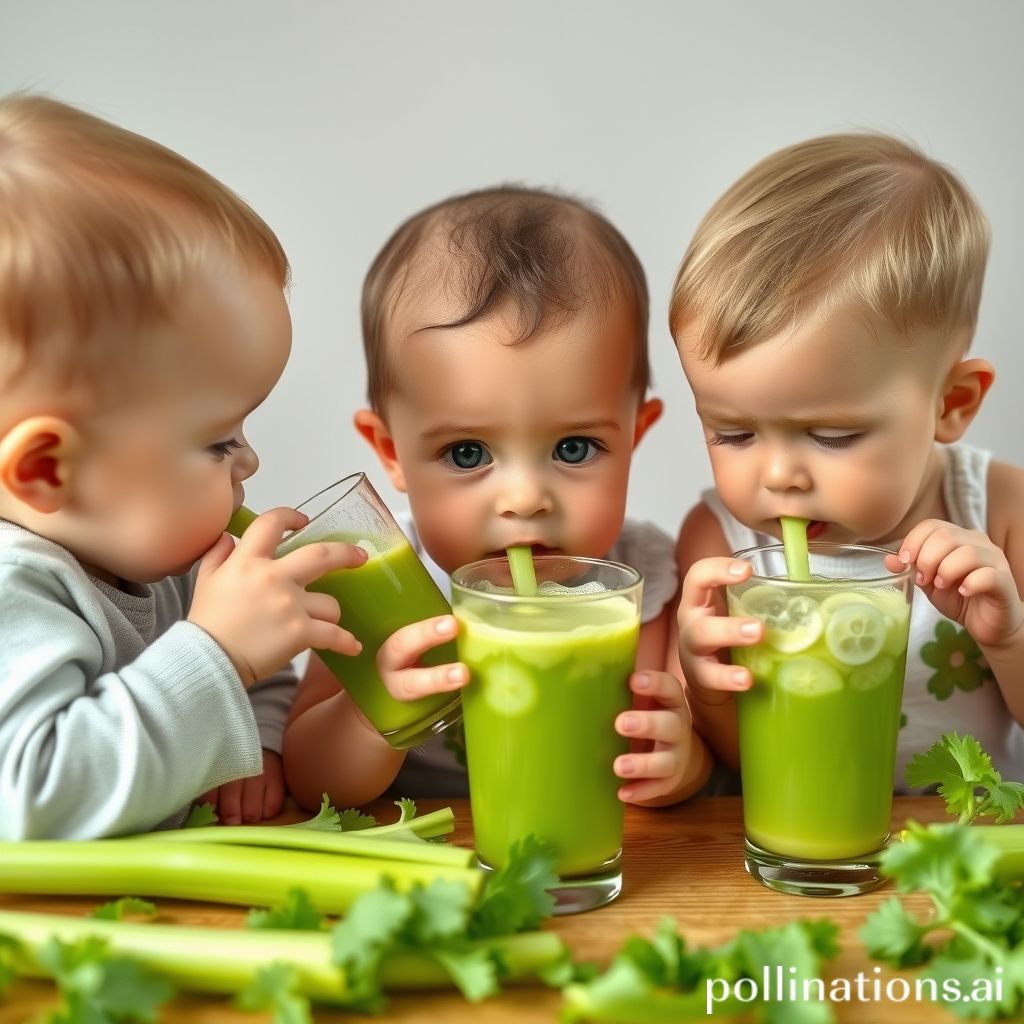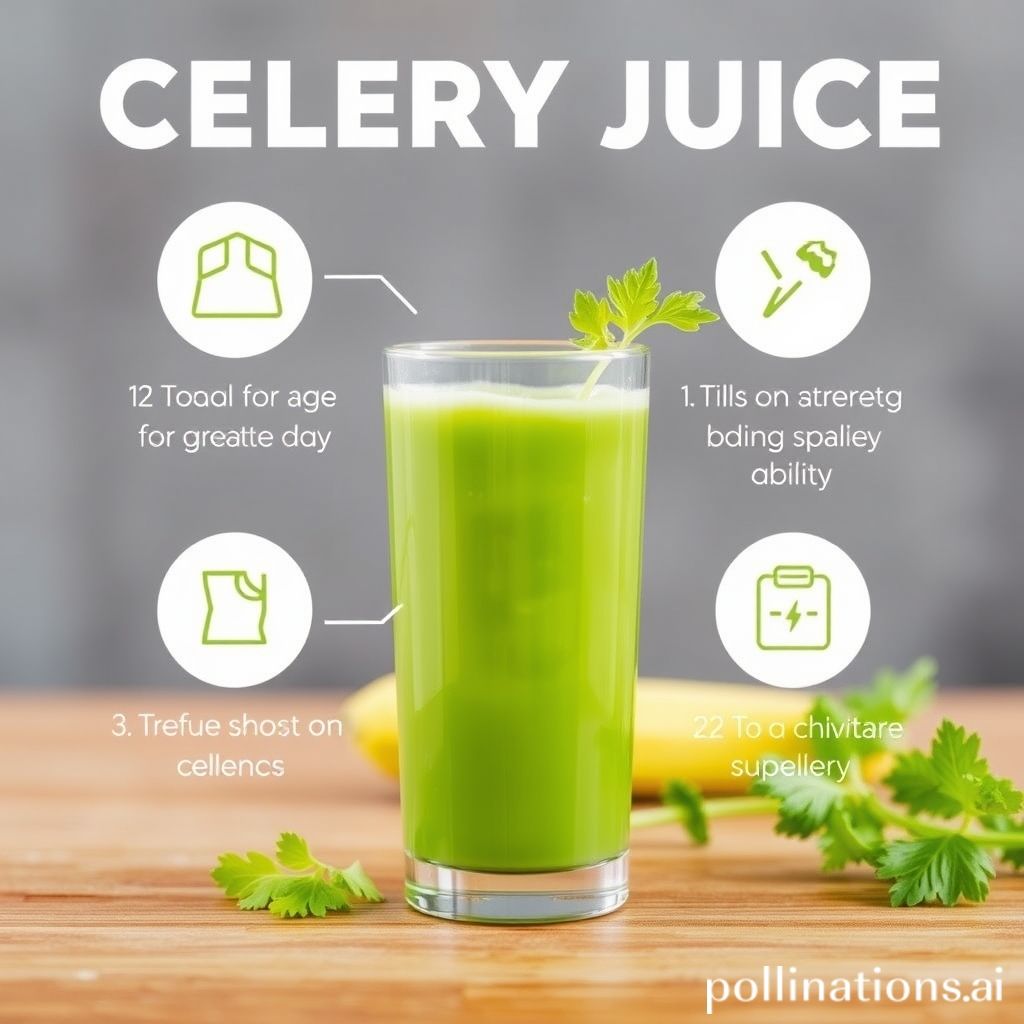Can Babies And Children Drink Celery Juice?
Can Babies and Children Benefit from Celery Juice? Discover the Secrets to Nourishing Your Little One’s Health. As parents, we’re constantly seeking ways to support our children’s well-being. The rise of celery juice as a popular health trend has left many wondering if it’s safe for infants and kids.
In this article, we’ll unravel the truth, providing you with expert insights and guidelines to make informed choices. From potential risks to incorporating celery juice into your child’s diet, we’ll delve into everything you need to know. Get ready to unlock the nutritional wonders of celery juice for your little one’s optimal health.

Table of Contents
Is Celery Juice Safe for Babies?
Expert Opinions and Recommendations on Safety
Experts have varying opinions on the safety of introducing celery juice to babies. While some believe it can be included in their diet, others advise caution due to certain considerations. It is crucial to consult with a pediatrician before introducing celery juice to your baby’s diet.
Considering Digestive Issues and Allergies
1. Digestive Issues:
– Babies have delicate digestive systems, and introducing new foods can sometimes lead to digestive issues such as gas or diarrhea. Celery juice contains natural sugars and fiber, which may affect digestion in some infants. Start by offering small amounts and monitor your baby’s reaction closely.
– If your baby has a history of digestive issues or is prone to constipation, it is advisable to introduce celery juice gradually and in consultation with a healthcare professional.
2. Allergies:
– Celery is considered a common allergenic food, and some babies may be allergic to it. Allergic reactions can range from mild symptoms like hives or itching to severe reactions like difficulty breathing or anaphylaxis.
– Introduce celery juice cautiously and watch for any signs of an allergic reaction. If your baby has a known allergy to celery or other allergenic foods, it is best to avoid celery juice altogether.
Considering the potential digestive issues and allergies associated with celery juice, it is essential to introduce it to your baby’s diet slowly and under professional guidance. Pay attention to your baby’s individual response and discontinue use if any adverse reactions occur. Remember, every baby is different, and what works for one may not work for another.
Introduce celery juice slowly & consult a pediatrician. Watch for digestive issues & allergic reactions. Every baby is different.Nutritional Value of Celery Juice for Children
Highlighting the Essential Vitamins and Minerals in Celery Juice
| Vitamins | Minerals |
|---|---|
|
|
Potential Health Benefits for Children’s Growth and Development
- Supporting Bone Health and Growth: The vitamins and minerals in celery juice contribute to strong bones and proper growth in children.
- Boosting Immune System Function: The high vitamin C content in celery juice helps strengthen the immune system, protecting children from illnesses.
- Promoting Healthy Digestion: Celery juice contains fiber that aids in digestion, preventing constipation and promoting a healthy gut.
Comparing the Nutritional Content to Other Juices
- Lower Sugar Content Compared to Fruit Juices: Celery juice is a healthier alternative to fruit juices as it contains less sugar, reducing the risk of dental issues and obesity.
- Higher Fiber Content Compared to Some Fruit Juices: The fiber in celery juice aids in regulating blood sugar levels and maintaining a healthy weight.
Introducing Celery Juice to Babies and Children
Age-appropriate Guidelines for Introducing Celery Juice
Introducing celery juice to babies and children can be a healthy addition to their diet, but it is important to follow age-appropriate guidelines.
- 6-12 months: Before introducing celery juice, consult with a pediatrician. Start with small amounts, diluted with water or breast milk/formula, and offer in a sippy cup or small open cup. Gradually increase the amount as tolerated.
- 1-3 years: Children can consume pure celery juice. Serve it fresh and strain it properly to remove any fibrous pieces. Begin with small amounts and observe for any adverse reactions. Increase the serving size if your child enjoys the taste.
- 4 years and older: Children in this age group can consume celery juice without major restrictions. Serve it as a refreshing beverage or incorporate it into smoothies or other recipes to enhance the nutritional value of their meals.
Tips for Incorporating Celery Juice into a Child’s Diet
Here are some helpful tips to incorporate celery juice into your child’s diet:
- Start small: Begin with small amounts of celery juice and gradually increase the serving size as your child becomes accustomed to the taste.
- Mix with other fruits or vegetables: If your child is hesitant about the taste of celery juice, mix it with other fruits or vegetables to create a more appealing flavor. Try combinations like apple-celery or cucumber-celery juice.
- Offer as a snack or meal accompaniment: Serve celery juice as a healthy snack or as a refreshing drink alongside meals. Encourage your child to drink it instead of sugary beverages.
Ensuring a Balanced and Varied Diet for Children
While introducing celery juice, it is essential to maintain a balanced and varied diet for children. Celery juice should not replace other important food groups and nutrients. Consider the following:
- Include a variety of fruits and vegetables: Along with celery juice, encourage your child to consume a diverse range of fruits and vegetables to ensure they receive a wide array of vitamins, minerals, and antioxidants.
- Provide protein and whole grains: Incorporate lean proteins like poultry, fish, beans, and whole grains such as brown rice or whole wheat bread to support your child’s growth and development.
- Limit processed foods and sugary snacks: Minimize the intake of processed foods and sugary snacks, as they offer little nutritional value and can displace healthier options in your child’s diet.
Remember, every child is different, and it is important to monitor their individual response to celery juice. If you have any concerns or questions, consult with your pediatrician for personalized guidance.

Potential Risks and Precautions: Can Babies And Children Drink Celery Juice?
| Outline V |
|---|
A. Addressing potential digestive issues and allergies related to celery juice
|
B. Monitoring for allergic reactions in children
|
C. Consulting a pediatrician for concerns
|
D. Considering the impact of celery juice on existing medical conditions
|
When it comes to babies and children consuming celery juice, it is important to be aware of potential risks and take necessary precautions. This section will address various aspects related to potential risks and precautions associated with celery juice consumption in infants and children.
A. Addressing potential digestive issues and allergies related to celery juice
Celery juice may cause digestive discomfort in some infants and children. It is essential to understand the possibility of such discomfort and take appropriate measures. Additionally, allergic reactions to celery juice can occur, and it is important to explore the associated risks.
B. Monitoring for allergic reactions in children
Parents must be educated about the signs and symptoms of an allergic reaction to celery juice in children. Immediate medical attention should be sought if any allergic reaction occurs to ensure prompt and appropriate treatment.
C. Consulting a pediatrician for concerns
Prior to introducing celery juice to babies or children, parents should seek professional advice from a pediatrician. Each child is unique, and individualized recommendations can help address specific concerns and ensure the safety of celery juice consumption.
D. Considering the impact of celery juice on existing medical conditions
Celery juice may interact with certain medications or medical conditions. It is crucial to discuss potential interactions and seek consultation with a healthcare professional, especially for children with specific health concerns, before incorporating celery juice into their diet.
Alternatives to Celery Juice for Babies and Children
Exploring other nutritious options for infants and young children
When it comes to providing healthy and nutritious beverages for babies and children, celery juice may not always be the best choice. Fortunately, there are numerous alternatives that can offer similar benefits. It is important to consider the age and developmental stage of the child when introducing new foods and beverages. Here are some alternative options to consider:
Suitable fruit and vegetable juices for children’s health
1. Carrot Juice: Rich in beta-carotene and vitamin A, carrot juice is an excellent choice for promoting good eyesight and a healthy immune system in children.
2. Apple Juice: Packed with antioxidants and essential nutrients, apple juice is a popular and refreshing option for children. It is important to choose 100% pure apple juice without added sugars or preservatives.
3. Spinach Juice: Spinach is a nutrient powerhouse, and its juice can provide children with a good dose of iron, calcium, and vitamins A and C. Mixing it with other fruits like apple or pear can help enhance the flavor.
4. Beetroot Juice: Beetroot juice is rich in antioxidants and can help support healthy liver function. However, it is important to dilute it with water or mix it with milder juices like apple to reduce its strong taste.
5. Orange Juice: A classic favorite, orange juice is packed with vitamin C, which supports a strong immune system. Opt for freshly squeezed orange juice or 100% pure orange juice without added sugars.
Recommendations for a well-rounded diet
While juices can be a part of a child’s diet, it is essential to offer a variety of foods to ensure a well-rounded and balanced nutritional intake. Here are some recommendations for a healthy diet for babies and children:
– Include a mix of fruits, vegetables, whole grains, proteins, and healthy fats in their meals.
– Offer a wide range of colors and textures to introduce different flavors and nutrients.
– Limit the consumption of processed and sugary foods, including juices with added sugars.
– Encourage drinking water as the primary beverage for hydration.
– Consult with a pediatrician or a registered dietitian for personalized dietary recommendations based on the child’s age, health, and specific dietary needs.
Remember, introducing new foods and beverages should be done gradually, and any signs of allergies or adverse reactions should be monitored closely. By providing a diverse and nutritious diet, parents can ensure the optimal growth and development of their children.
Conclusion
In conclusion, while celery juice can offer important nutrients for babies and children, it is crucial to introduce it at an appropriate age and in moderation. Prior to incorporating celery juice into their diet, parents should consider any potential digestive issues or allergies and consult with a pediatrician if needed.
It is also vital to ensure a well-rounded and diverse diet for children, exploring other nutritious options. Personalized advice from healthcare professionals and further research are recommended. By taking these precautions and seeking professional guidance, parents can make informed decisions regarding celery juice and their child’s overall well-being.
Faq about Can Babies And Children Drink Celery Juice?
FAQ 1: Can I give celery juice to my 6-month-old baby?
Answer: It is recommended to wait until the baby is at least 9-12 months old before introducing celery juice.
FAQ 2: Are there any risks of celery juice causing allergies in children?
Answer: Celery allergies in children are rare, but it’s important to monitor for any allergic reactions and consult a pediatrician if concerned.
FAQ 3: Can celery juice help with constipation in babies?
Answer: While celery juice may have mild laxative effects, it’s best to consult a pediatrician for appropriate remedies for constipation in babies.
FAQ 4: How much celery juice can children consume in a day?
Answer: Children should consume small amounts of celery juice, such as 1-2 ounces, and ensure a varied diet.
FAQ 5: Can celery juice be diluted for infants?
Answer: Diluting celery juice with water may be appropriate for infants, but it’s important to consult a pediatrician for specific guidance.

